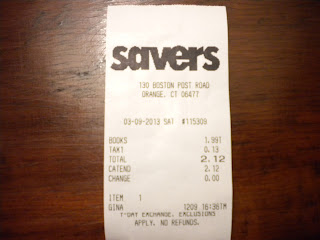Jennifer K. Sweeney (photo by Chad Sweeney)
I have taken to attending an odd store called "Savers" on the Post Road in Orange. Perhaps because it is close to New Haven it has a surprisingly varied collection of books. I have almost forgotten what it feels like to wander among books. The Internet has made the experience rare. The books are appealing because they are vaguely organized into categories like "classics" and yet they are still packed onto the shelves in complete randomness. Bright fluorescent light and ambient clatter makes the books feel abandoned. It is satisfying.
Today I discovered a book of poems written in 2009 by Jennifer K. Sweeney. The book is organized into five large numbered sub-collections that read like movements of a program symphony. A "Nocturne" opens the collection but stands alone, outside of its numbered movements. In this "Nocturne," she described a musician who sits alone and plays "a harp without strings."
"The world," she writes, "filters through || his empty frame as he plucks the air."
"Maybe you hear a song or maybe you don't.
That is the choice we are always making."
I heard a song. It was by Schubert (An die Freunde D.654). When the song had finished in my mind, I was already outside of the store. I had paid $2.12 and gave the cashier exact change.
The music that is actually sounded in the book includes a collection of italicized lyrics from songs by Bob Dylan, Joan Baez,Van Morrison, and Simon and Garfunkel among others. There is very little classical music, and yet neither is it excluded. There is a particular listening that is familiar.
The narrator of the second movement (called "The Listeners") learned music from "record albums" and shared the experience with a father who would "rush out to us begging someone || to hear what he's just heard." This capacity of recorded music to be repeatable, to cheat time by always fading into it but yet standing as an object ready to be shared at any time, saturates this wonderful poem.
The "trick of listening," said the father, is "to find the song that is autobiographical." How can this autobiographical quality come from a song written by someone else? Sweeney shows how we re-harmonize our past.
"Lights out, I listened and swayed,
trying to feel what saved him."
The narrator was "practicing for angst."
This likeable book of poems is filled with music, even when music is not specifically the subject. I was drawn to the collection and suspect you might be also, unexpected friend. In the meantime Sweeney suggests that we broaden our diet by adding bread to it.

